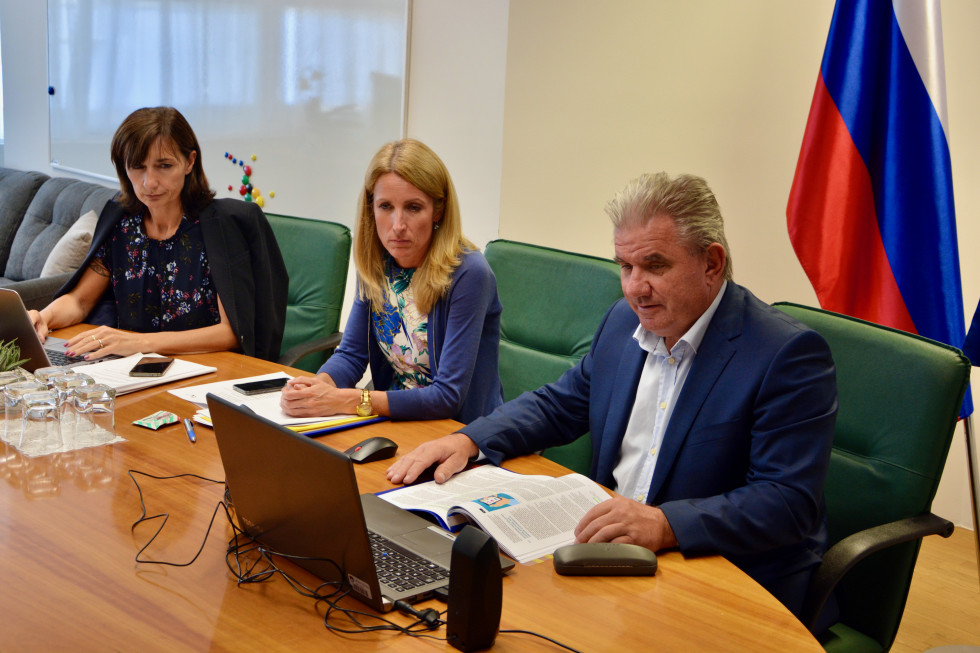Environment Minister Andrej Vizjak in a videoconference: digital technologies can play an important role in sustainable EU transition
- Ministry of the Environment and Spatial Planning

Minister Vizjak at a videoconference
On the second day the ministers continued the discussion started in the spring on the European Climate Law and other measures for reducing greenhouse gas emissions. The ministers once again highlighted the role of the European Green Deal and the measures it envisages for transition to a sustainable and more resilient society. They agreed that when planning any measures, it should be ensured that those measures are in accordance with the EU climate goals and comply with the "do no harm" principle. Public and private investments in low-carbon technologies, green jobs and digital solutions will be of key importance in pursuing the goals of the European Green Deal and strengthening the European economy.
Mr Vizjak emphasised that building a resilient Europe is not possible without including environmental and climate considerations in all relevant sectors, while ensuring sustainable investments that will contribute to the climate neutrality of the EU. He also reiterated the importance of the Circular Economy Action Plan. The COVID-19 crisis has shown how important it is to be self-sufficient, particularly in waste management. Therefore, the action plan should be used to promote the market of high-quality secondary raw materials.
The ministers also held an interactive discussion in small groups on the topic of digitalisation in relation to the environment and climate change. In view of the coming Slovenian presidency next year, Mr Vizjak moderated one of the four panels on digitalisation, together with the European Commissioner for the Environment, Virginijus Sinkevičius, the Executive Director of the European Environment Agency, Hans Bruyninckx, and the Austrian Environment Minister, Leonore Gewessler. Targeted activities for increasing the digitalisation rate can contribute to the achievement of climate goals, environmental protection and the efficient use of resources. The German presidency would like to encourage political debate before the drafting and adoption of the EU Council decisions on the role of digitalisation in environmental and climate policies, which is planned for the Environment Council meeting in December.
Mr Vizjak stressed that the development and use of digital technologies can play an important role in the sustainable transition of the EU and also contribute to the greater productivity and competitiveness of European economy. Furthermore, digitalisation allows producers, as well as consumers, to better trace the use of sources and raw materials throughout the process, which builds the trust and helps consumers make sustainable decisions about products and services. The ministers supported the planned activities for establishing the European data centre under the Green Deal. It is important to ensure the greening of the IT sector by ensuring that it is energy and material efficient.
Today, the ministers continued the discussion on climate change measures, in particular the process of adopting the European Climate Law. This law is one of the measures planned within the European Green Deal, which will facilitate the transition to a low-carbon circular economy, ensure a stable environment for investors and consumers, and indicate a clear path for EU development until 2050.
Mr Vizjak pointed out that the transition to a climate neutral economy will require the cooperation of all relevant sectors, in particular the transport, agriculture, energy and construction sectors. It will be essential to provide appropriate financial support to Member States in order to ensure a just transition in the spirit of solidarity. In view of international climate negotiations and the Conference of the Parties of the Climate Change Convention next year (COP26 UNFCCC), Mr Vizjak emphasised the importance of maintaining EU's leading role at the global level, for which Slovenia will also strive during its presidency of the Council of the EU in the second half of 2021.

